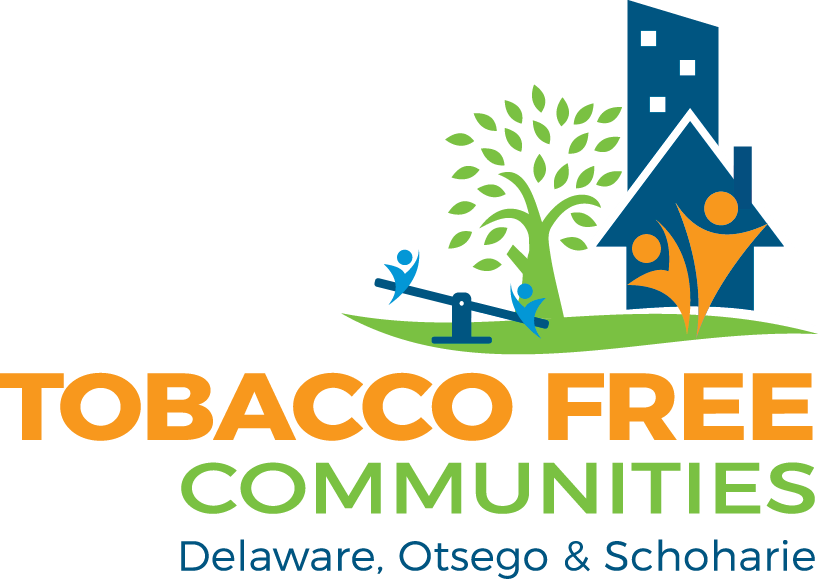Catskill Veterans Outreach Center Goes Tobacco-Free
That is why Scalise and the board of directors of the Utica Center for Development worked with staff from Advancing Tobacco Free Communities in Delaware, Otsego and Schoharie Counties (ATFC-DOS) to develop and adopt a tobacco-free policy for the Catskill Veterans Outreach Center earlier this year. Recently ATFC-DOS presented Scalise and Jeff Ostrander, an outreach worker at the center, with tobacco-free zone signage to post at its entrances and in its parking lot. The veterans’ center currently offers food, clothing and a place for veterans to hang out during the day Monday through Friday.
According to Scalise “Tobacco addiction is an issue for the military clientele with whom we work. I would say that 80 percent of our clients use tobacco. The older vets have smoking embedded in their culture. Many of them started smoking when cigarette advertising was still on television. It’s very difficult to quit and we should offer whatever assistance we can.” He is a veteran of the wars in Iraq and Afghanistan where he served as an Army infantryman for 19 years. Scalise remains active with the Army National Guard.
Scalise began smoking when he was 13 years old, which continues to be the average age of a new smoker in New York State. He shared that both his parents smoked and as a child, he used to run to the store to buy cigarettes for his grandmother. His habit grew over the years until he became a 1 ½ pack-a-day smoker and his tobacco addiction controlled his life. He used to visit a convenience store in Utica daily to purchase cigarettes and was known by his tobacco brand.
Scalise recalls that he made at least ten failed quit attempts. He knew his situation was not healthy and he set a goal to be tobacco-free by the end of his tour in Afghanistan when he knew his stress level would be greatly reduced. He participated in a military-sponsored quit class and was advised to buy patches when he was down to his last pack of cigarettes. The patches and nicotine replacement medications helped him quit and Scalise has now been tobacco-free for five years.
“Many smokers in the military want to quit, but because nicotine is so addictive, most individuals fail when they try to quit smoking on their own,” Scalise said. The military is currently offering more assistance to help active military personnel and veterans quit tobacco. In 2013, the U.S. Department of Defense issued rules to expand smoking cessation coverage for military personnel. The Veterans Health Administration indicates that 18 percent (1.5 million) of the veteran enrollee population quit smoking in 2015.
“The hardest thing during the first year after I quit was being around other smokers,” shared Scalise. “The tobacco-free policy that we adopted for the veterans center prohibits the use of all tobacco products including cigarettes, cigars, chew, dip and e-cigs/vape pens. That way there will not be any environmental cues to trigger cravings among reformed smokers or smokers trying to quit.”
Tobacco is the leading cause of preventable death in the United States, killing more than 480,000 Americans every year. “Personal stories like that of Vincent Scalise put a face on the negative health impacts of tobacco use,” according to Linda Wegner, program director for ATFC-DOS.
The New York State Department of Health, Bureau of Tobacco Control funds ATFC-DOS through a grant to the Research Foundation of SUNY at SUNY Cobleskill. ATFC-DOS educates the community and decision-makers, mobilizes community members around the problems that tobacco addiction causes in local communities, and helps decision-makers understand the types of choices that they have to address these problems.



